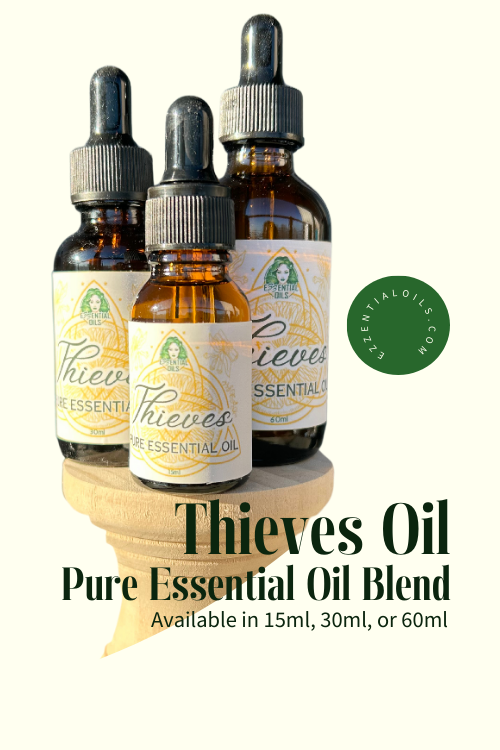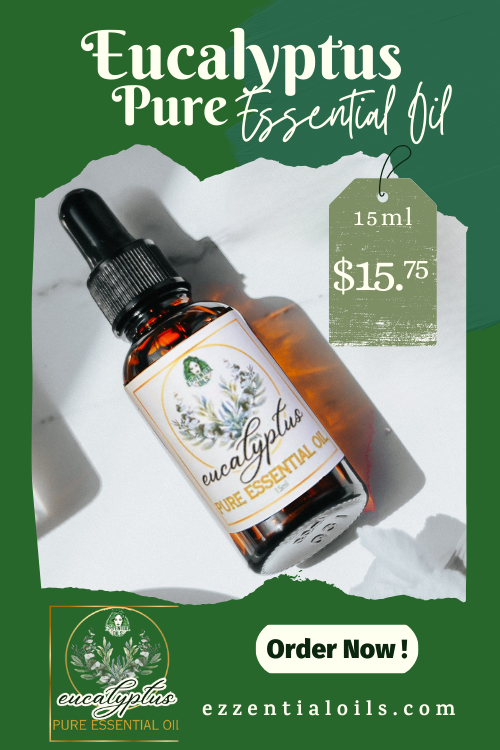Boosting Productivity And Well-Being:
How Aromatherapy Can Transform Your Workplace
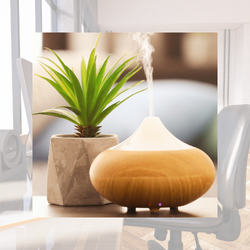 A positive work environment that supports the mental and emotional health of its workforce leads to increased job satisfaction and a more cohesive, engaged team. Aromatherapy in the workplace can offer numerous benefits, creating a more pleasant and productive environment. By promoting relaxation, reducing stress, and enhancing mood, aromatherapy contributes to the overall well-being of employees.
A positive work environment that supports the mental and emotional health of its workforce leads to increased job satisfaction and a more cohesive, engaged team. Aromatherapy in the workplace can offer numerous benefits, creating a more pleasant and productive environment. By promoting relaxation, reducing stress, and enhancing mood, aromatherapy contributes to the overall well-being of employees.
Stress Reduction
Aromatherapy helps alleviate stress, a prevalent issue in many work environments. Certain essential oils like lavender, chamomile, and bergamot have calming properties that can reduce stress levels among employees. Inhalation or diffusing these oils in the workplace can promote relaxation and a sense of calm, enhancing overall well-being.
Enhanced Focus and Concentration
Certain essential oils, such as peppermint, rosemary, and lemon, are known for their ability to stimulate the mind and increase alertness. Diffusing these oils in the workplace can help employees stay focused, attentive, and more productive throughout the day.Mood Enhancement
Aromatherapy has the potential to uplift mood and create a more positive atmosphere. Citrus oils like orange and grapefruit are often used for their refreshing and mood-boosting properties, fostering a more cheerful and energized environment among colleagues.
Reduced Anxiety and Tension
Work environments can sometimes be tense. Essential oils like clary sage, ylang-ylang, and frankincense have calming effects that can alleviate anxiety and tension. Using these oils in the workplace promotes a more harmonious and relaxed atmosphere.
Improved Air Quality
Aromatherapy can contribute to better indoor air quality. Essential oils possess natural antibacterial and antiviral properties, and when diffused, they can help purify the air, potentially reducing the spread of airborne pathogens and creating a healthier workspace.
Increased Productivity and Creativity
Aromatherapy's ability to reduce stress and enhance focus can lead to increased productivity. Some essential oils are believed to stimulate creativity and problem-solving abilities, potentially benefiting brainstorming sessions and creative tasks in the workplace.

Incorporating essential oils in the workplace can be a powerful tool for energizing and motivating employees.
Citrus Oils for Energy
Citrus essential oils like orange, lemon, and grapefruit are renowned for their energizing properties. These invigorating scents can stimulate the senses, promote alertness, and increase energy levels, making them ideal for morning boosts or midday slumps in the workplace.
Peppermint for Mental Alertness
Peppermint oil is known for its refreshing and stimulating aroma. It can enhance mental clarity, focus, and concentration, making it an excellent choice for tasks requiring attention to detail or during brainstorming sessions, promoting a more engaged and motivated workforce.
Eucalyptus for Invigoration
Eucalyptus essential oil possesses revitalizing properties that can combat mental fatigue and promote vitality. Its fresh and uplifting scent can enhance motivation and productivity, especially in workplaces where employees may experience physical or mental tiredness.
Rosemary for Cognitive Stimulation
Rosemary oil is believed to stimulate cognitive function and memory. Its aroma can enhance mental sharpness and cognitive performance, aiding employees in staying focused and motivated throughout the workday.
Cinnamon for Increased Alertness
Cinnamon essential oil offers a warm and stimulating scent that can enhance alertness and combat mental exhaustion. Diffusing this oil in the workplace can promote an environment of energy and motivation, aiding in tasks requiring sustained attention.
Creating an Energizing Atmosphere
Utilizing diffusers or room sprays with these essential oils in common areas or meeting rooms can contribute to a more energized and motivated workspace. Offering employees access to these invigorating scents allows for personalized use based on individual preferences.

Enhanced Work Environment
Essential oils play a pivotal role in creating a more pleasant and inviting work atmosphere. Aromatherapy diffusers or spritzers with oils like lavender, peppermint, or citrus blends can transform the ambiance, and reduce stress, making the workplace more inviting and enjoyable for employees.
Increased Morale and Mood Elevation
A positive work environment is crucial for employee satisfaction. Aromatherapy can positively impact mood and morale. Scents like citrus or floral blends are known to uplift mood, fostering a more cheerful and optimistic atmosphere among employees.
Support for Mental Well-being
Essential oils can support mental health in the workplace. Oils like bergamot, lemon, or rosemary can enhance focus and concentration, aiding in mental clarity and reducing mental fatigue, which contributes to employee satisfaction through improved work performance.
Promotion of Wellness Initiatives
Incorporating essential oils into wellness programs or initiatives demonstrates an employer's commitment to employee well-being. Offering aromatherapy sessions, workshops, or providing access to diffusers promotes a holistic approach to wellness, which positively impacts employee satisfaction.
Employee Engagement and Connection
Aromatherapy can foster a sense of community and connection among employees. When used in shared spaces, such as common areas or meeting rooms, it creates a shared sensory experience, promoting a feeling of togetherness and camaraderie among colleagues.

Introducing aromatherapy to new employees can be a thoughtful way to introduce them to the workplace culture while promoting a positive and supportive atmosphere. By offering information, options, and opportunities for engagement, new hires can feel welcomed and empowered to benefit from aromatherapy in their new work environment.
Welcoming Environment
Aromatherapy can serve as a warm and inviting introduction for new employees. A simple gesture like diffusing calming scents such as lavender or chamomile in common areas during orientation or onboarding sessions can help ease nerves and create a welcoming atmosphere.
Personal Choice and Inclusion
Encouraging new employees to participate in choosing scents for diffusers or room sprays can foster a sense of inclusion and ownership. Offering options and allowing individuals to select scents they find appealing creates a more personalized experience and enhances their comfort in the new environment.
Feedback and Adaptation
Encouraging feedback from new employees about their experience with aromatherapy allows for adjustments and improvements. Regularly seeking input on preferred scents or areas where aromatherapy might be more beneficial ensures that the practice aligns with the comfort and preferences of the entire team.

Creating a scent-safe workplace environment is crucial for accommodating sensitive individuals while still benefiting from aromatherapy.
Establishing clear guidelines or policies regarding scents in the workplace is essential. Communicate to all employees the importance of being mindful of strong scents and their potential impact on others. Encourage the use of mild or subtle aromas, or designate specific areas for diffusers to minimize the spread of scents across the workspace.
Scent-Free Zones
Designate specific areas within the workspace as scent-free zones. These areas could include meeting rooms, communal spaces, or sections where sensitive individuals primarily work. By respecting these zones, employees can ensure a more comfortable environment for everyone.
Open Communication
Encourage open communication among team members regarding scent sensitivities. Employees can express their concerns or preferences regarding scents through open discussions or anonymous feedback channels, fostering a respectful and understanding workplace culture.
Alternative Aromatherapy Methods
Offer alternative aromatherapy methods for sensitive individuals. Personal inhalers or diffusers at individual workstations allow employees to experience the benefits of essential oils without affecting others. This approach promotes inclusivity while maintaining a scent-safe environment.
Creating a scent-safe workplace environment requires a balance between enjoying the benefits of aromatherapy and respecting the sensitivities of others. Through clear policies, open communication, and consideration for individual preferences, it's possible to create a workspace where everyone feels comfortable and supported.
Aromatherapy Diffusers in the Workplace: Dos and Don'ts
Using aromatherapy diffusers in the workplace can bring numerous benefits if handled thoughtfully. Here are the dos and don'ts when it comes to incorporating diffusers at work:
DO
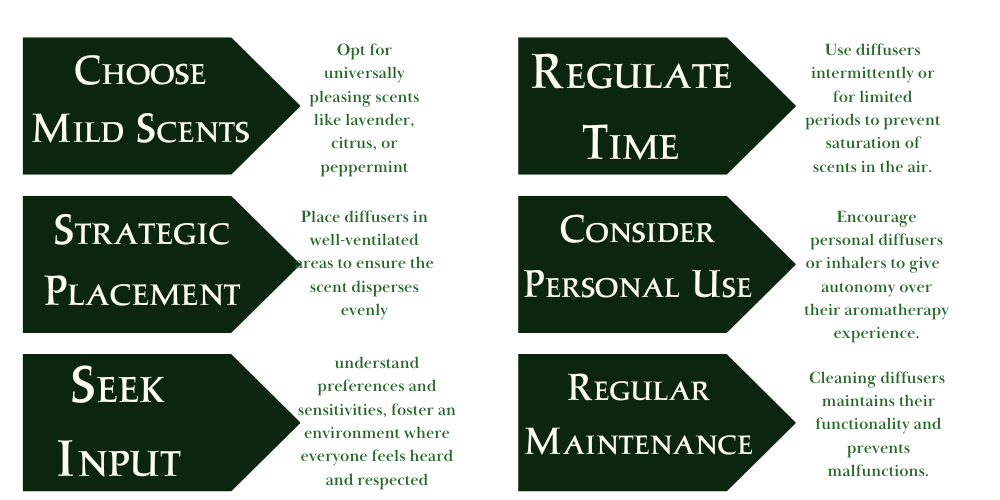
DON'T
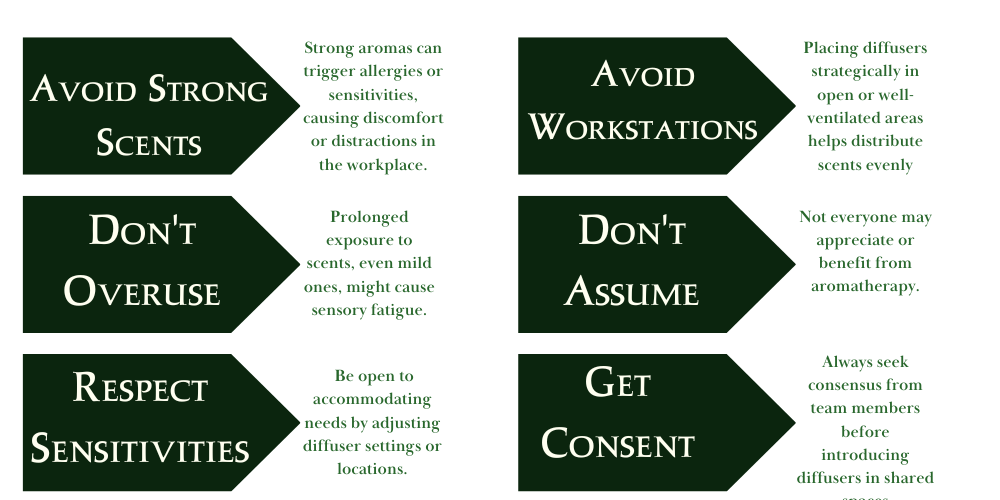
Adopting these dos and don'ts when using diffusers in the workplace promotes a balanced and inclusive approach to enjoying the benefits of aromatherapy while considering the preferences and sensitivities of all employees.

Understanding Employee Morale
Employee morale plays a pivotal role in shaping the dynamics of a workplace, influencing not only individual job satisfaction but also the overall productivity and atmosphere within an organization. A positive work environment, fostered by high morale, leads to increased motivation, creativity, and teamwork.
When employees feel valued, supported, and engaged, they are more likely to invest their energy and skills into their work. High morale is a catalyst for heightened productivity, as motivated employees are driven to achieve their best results.
A positive atmosphere encourages better collaboration and teamwork, creating a cohesive and harmonious workplace culture. As individuals feel a sense of belonging and purpose, the collective morale elevates, leading to a more resilient and efficient workforce. Recognizing the significance of employee morale not only enhances job satisfaction but also establishes a foundation for sustained success, innovation, and positive organizational growth.
Lemon for Uplifting Spirits
 Lemon essential oil is a remarkable mood-boosting option, renowned for its invigorating and refreshing scent. The citrusy aroma of lemon oil has the power to uplift spirits and create a positive atmosphere. Diffusing this essential oil in common areas or incorporating it into workplace-friendly personal inhalers can significantly contribute to enhancing employees' moods and elevating overall morale. The crisp and energizing fragrance of lemon oil not only stimulates the senses but also helps alleviate stress and promote mental clarity. Its vibrant and cheerful notes have the potential to create a more pleasant work environment, fostering a sense of well-being and motivation among employees. As a natural and uplifting solution, incorporating lemon essential oil into the workplace setting can be a simple yet effective way to enhance the overall mood and contribute to a more positive and productive atmosphere.
Lemon essential oil is a remarkable mood-boosting option, renowned for its invigorating and refreshing scent. The citrusy aroma of lemon oil has the power to uplift spirits and create a positive atmosphere. Diffusing this essential oil in common areas or incorporating it into workplace-friendly personal inhalers can significantly contribute to enhancing employees' moods and elevating overall morale. The crisp and energizing fragrance of lemon oil not only stimulates the senses but also helps alleviate stress and promote mental clarity. Its vibrant and cheerful notes have the potential to create a more pleasant work environment, fostering a sense of well-being and motivation among employees. As a natural and uplifting solution, incorporating lemon essential oil into the workplace setting can be a simple yet effective way to enhance the overall mood and contribute to a more positive and productive atmosphere.
Sweet Orange for Optimism
 Sweet orange essential oil is celebrated for its uplifting and cheerful properties, with a citrusy aroma that has the remarkable ability to evoke feelings of happiness and positivity. The bright and refreshing scent of sweet orange oil can instantly lift spirits and create an optimistic atmosphere. Incorporating this essential oil into workplace settings by using diffusers during team meetings or breaks can contribute to fostering a sense of well-being among employees. The uplifting properties of sweet orange oil not only enhance mood but also promote a positive mindset, making it an ideal choice for infusing energy and enthusiasm into the workday. Whether in shared spaces or personal workstations, the cheerful notes of sweet orange essential oil have the potential to transform the mood, creating a more vibrant and upbeat environment that supports overall morale and team cohesion.
Sweet orange essential oil is celebrated for its uplifting and cheerful properties, with a citrusy aroma that has the remarkable ability to evoke feelings of happiness and positivity. The bright and refreshing scent of sweet orange oil can instantly lift spirits and create an optimistic atmosphere. Incorporating this essential oil into workplace settings by using diffusers during team meetings or breaks can contribute to fostering a sense of well-being among employees. The uplifting properties of sweet orange oil not only enhance mood but also promote a positive mindset, making it an ideal choice for infusing energy and enthusiasm into the workday. Whether in shared spaces or personal workstations, the cheerful notes of sweet orange essential oil have the potential to transform the mood, creating a more vibrant and upbeat environment that supports overall morale and team cohesion.
Grapefruit for Energizing Vibes
 Grapefruit essential oil is a dynamic tool for providing an energetic boost in the workplace. Its invigorating and refreshing scent possesses the unique ability to promote enthusiasm and vitality among employees. The crisp citrus aroma of grapefruit oil has a revitalizing effect, making it an excellent choice for infusing energy into the workspace. Diffusing grapefruit oil in the morning or during mid-day slumps can awaken the senses and offer a natural solution to combat fatigue. This zesty essential oil not only provides a pleasant and uplifting fragrance but also contributes to fostering a vibrant and dynamic atmosphere. By incorporating grapefruit essential oil into the work routine, employees may find themselves rejuvenated and ready to tackle tasks with renewed vigor, ultimately contributing to a more energetic and productive work environment.
Grapefruit essential oil is a dynamic tool for providing an energetic boost in the workplace. Its invigorating and refreshing scent possesses the unique ability to promote enthusiasm and vitality among employees. The crisp citrus aroma of grapefruit oil has a revitalizing effect, making it an excellent choice for infusing energy into the workspace. Diffusing grapefruit oil in the morning or during mid-day slumps can awaken the senses and offer a natural solution to combat fatigue. This zesty essential oil not only provides a pleasant and uplifting fragrance but also contributes to fostering a vibrant and dynamic atmosphere. By incorporating grapefruit essential oil into the work routine, employees may find themselves rejuvenated and ready to tackle tasks with renewed vigor, ultimately contributing to a more energetic and productive work environment.
Peppermint for Refreshment
 Peppermint essential oil, with its invigorating and refreshing qualities, stands out as a powerful stimulant for both the mind and body. The cool and minty aroma of peppermint oil has the remarkable ability to awaken the senses and promote mental clarity. Incorporating this revitalizing essential oil into the workplace, whether through diffusers or aromatherapy breaks, can provide employees with a quick and effective means to feel refreshed and rejuvenated. The stimulating properties of peppermint oil not only combat mental fatigue but also invigorate the body, contributing to increased alertness and focus. By incorporating peppermint essential oil into the work environment, employees can experience a natural and revitalizing pick-me-up, positively impacting their morale and overall well-being.
Peppermint essential oil, with its invigorating and refreshing qualities, stands out as a powerful stimulant for both the mind and body. The cool and minty aroma of peppermint oil has the remarkable ability to awaken the senses and promote mental clarity. Incorporating this revitalizing essential oil into the workplace, whether through diffusers or aromatherapy breaks, can provide employees with a quick and effective means to feel refreshed and rejuvenated. The stimulating properties of peppermint oil not only combat mental fatigue but also invigorate the body, contributing to increased alertness and focus. By incorporating peppermint essential oil into the work environment, employees can experience a natural and revitalizing pick-me-up, positively impacting their morale and overall well-being.
Essential Oils and Enhancing Customer Experience in Service Industries
In service industries, creating a memorable and inviting customer experience is paramount. Utilizing essential oils can be a subtle yet impactful way to elevate this experience. These oils possess unique aromatic qualities that can positively influence emotions and perceptions, making them a valuable addition to customer-facing environments.
The strategic use of essential oils can set the tone for a welcoming ambiance in various service settings, such as spas, hotels, or retail spaces. A carefully selected aroma, like lavender or citrus blends, can create a relaxing atmosphere that immediately puts customers at ease upon entering. This initial olfactory impression can significantly influence their perception of the service quality and overall experience.
For businesses focused on wellness or relaxation, essential oils can complement the offered services. Aromatherapy in massage rooms or yoga studios, for instance, can enhance the therapeutic effects of treatments. Oils like chamomile or bergamot, diffused subtly in these spaces, can contribute to a calming environment, aiding in relaxation and promoting a sense of well-being.
In hospitality settings, such as hotels or restaurants, the use of essential oils can leave a lasting impression on guests. A carefully curated scent, diffused in common areas or lobbies, can evoke positive emotions and memories, enhancing their overall experience. For instance, welcoming scents like vanilla or a fresh citrus blend can create a warm and inviting atmosphere, making guests feel more comfortable and relaxed.
In retail environments, the strategic use of essential oils can influence purchasing behavior. Certain scents, such as peppermint or eucalyptus, have been associated with increased alertness and improved focus. Employing these scents in specific areas, like checkout counters or product displays, may contribute to a more engaging and attentive shopping experience for customers.
It's crucial to approach the use of essential oils in service industries with consideration for individual preferences and sensitivities. Using mild, universally appealing scents and ensuring proper ventilation can help avoid overwhelming customers. Additionally, providing options or asking for feedback can ensure that the aromas chosen contribute positively to the customer experience without causing discomfort.
By harnessing the power of aromas, service-oriented businesses can create an inviting, relaxing, or even invigorating atmosphere for their customers. Careful consideration of essential oil usage, from selecting appropriate scents to implementing them thoughtfully, can significantly enhance the overall customer experience in various service industries.
Safety Precautions and Guidelines for Using Essential Oils at Work
Ensuring safety when using essential oils in the workplace is paramount for reaping their benefits without any adverse effects. Provide clear instructions on handling, dilution ratios, and safe application methods to mitigate any adverse reactions.
Selecting high-quality, pure essential oils is fundamental. Opt for reputable suppliers and look for oils that are free from additives or contaminants. Thoroughly research each oil's properties and potential contraindications, as some oils may not be suitable for certain individuals, such as pregnant women, individuals with respiratory conditions, or those with allergies.
Proper dilution is key to using essential oils safely in the workplace. Always dilute essential oils with a carrier oil before topical application to avoid skin irritation or sensitization. Encourage the use of carrier oils like jojoba, sweet almond, or coconut oil for dilution purposes, ensuring a safe and gentle application on the skin.
Safety Information
Please note, the International Federation of Aromatherapists do not recommend that Essential Oils be taken internally, unless under the supervision of a Medical Doctor, who is also qualified in clinical Aromatherapy. In addition, Essential Oils must be properly diluted before use, in order to avoid any damages to property or adverse physical effects (including injury or bodily harm).
This article is for information purposes only. All Ezzential Oils products are for external use only unless otherwise indicated. This information is not intended to diagnose, treat, cure, or prevent any disease, and it should not be used by anyone who is pregnant or under the care of a medical practitioner. Please refer to our policies for further details, and our disclaimer below.






